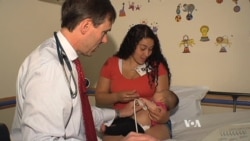Craig Sable is a special doctor. For more than a decade, the American cardiologist has been traveling to Uganda to examine children and coordinate surgeries on those with heart ailments.
Thousands of children in developing nations like Uganda are born with heart problems, and thousands of others contract heart disease in their youth.
Sable, a pediatric cardiologist at Children's National Medical Center in Washington, has led 17 medical missions to Uganda since 2002. He has overseen about 500 open heart surgeries on Ugandan children with a 95 percent survival rate, which he says is "almost as good as it gets in the United States."
American and Ugandan doctors perform the surgeries together, or Ugandan doctors take the lead with their U.S. counterparts giving backup support. Sable selects patients for operations and serves as a consultant before, during and after the procedures.
Twalib Aliku, a Ugandan cardiologist who has worked closely with Sable, said he acts as a mentor, training local medical experts to perform advanced cardiac procedures, "so that we develop an independent cardiac program that can function even when he's not there."
Virtually all of the operations have been on children born with congenital health defects such as holes in the heart, blockages and leaky valves.
The procedures are done in partnership with the Uganda Heart Institute at Mulago National Referral Hospital in the capital, Kampala. Uganda, Sable said, has a "wonderful" cardiology team and is one of three sub-Saharan countries, along with Kenya and Ghana, where open heart surgeries can be performed entirely by local doctors.
The 52-year-old cardiologist is inspired by the improvements he believes he and his team can make in the lives of Ugandan children.
"I think the most striking thing to me is when I walk into the waiting room and see 50 to 100 children who I know … we have a chance to help them," said Sable. "When I first went in 2002, there was no hope. Now, we're treating about a-third to a-half of who we see. That's still way too few. But when you look in the children's eyes and the parents' eyes, you just know there's an opportunity to make a difference."
Big heart
The presence of an accomplished physician like Sable gives parents hope that their children will overcome their heart defects.
"And they'll wait 10 hours, three days, take a bus for 20 hours, because they know that us being there means their child can live a normal life versus die at a young age," he said. "And with that tremendous expectation, we've really got to do everything we can to try to close the gap and allow these kids to get the care they deserve."
Ugandan team member Aliku says Sable's efforts to establish a sustainable cardiac surgery program in Uganda make it a model for the rest of Africa.
Sable chose to focus those efforts on Uganda because of the the central African country's advancements in pediatric cardiology. But due to a lack of vital medical equipment and other necessities, he was unable to coordinate surgeries and instead focused only on diagnostics.
He brought some kids back to the United States for surgery, "but that was very expensive and not sustainable," he explained. "So I was highly motivated to try to move toward a solution that would help change the equation for these children and hopefully use Uganda as a model for other programs."
Under his leadership, Uganda made strides to eventually perform its first open heart surgery in 2007.
Will never quit
Sable found that for every one Ugandan child with congenital heart problems, there were 10 with rheumatic heart disease, an inflammatory reaction in the heart that can lead to death if not treated at an early stage.
The inflammation is linked to strep throat infection, in which the body tries to fight the bacteria but ends up damaging valves in the heart instead.
Rheumatic heart disease is the number one cardiac problem in the developing world and is prevalent in sub-Saharan Africa. Unlike congenital heart disease, it is preventable with a dose of penicillin each month at a minimal cost.
"However, most children in the developing world never know they have [strep throat], and they don't get diagnosed until it's too late," Sable said, adding that his grandmother's bout with rheumatic heart disease inspired him to become a doctor. "So we thought, 'let's try and see if we can come up with a way to improve early detection and prevention of rheumatic heart disease'."
His colleague at Children’s National Medical Center, cardiologist Andrea Beaton, has screened thousands of Ugandan school-age children for rheumatic heart problems in Uganda since 2009.
In partnership with General Electric, she tested a small echocardiogram machine in the northern Ugandan city of Gulu and found that it accurately detected rheumatic heart defects.
With that success, Sable said, "we're trying to move toward a way to try to identify children early, give them penicillin and get to them long before their hearts are damaged."
Several charities have financed Sable's work in Uganda. He said he won't ever feel he has done all he can to help ailing Ugandan children.
"I think we’re going to continue to work with them and continue to help them advance. My hope is Uganda can transition from being a fledgling program that does a few heart surgeries to being a model for the region and other parts of the developing world," said Sable.





